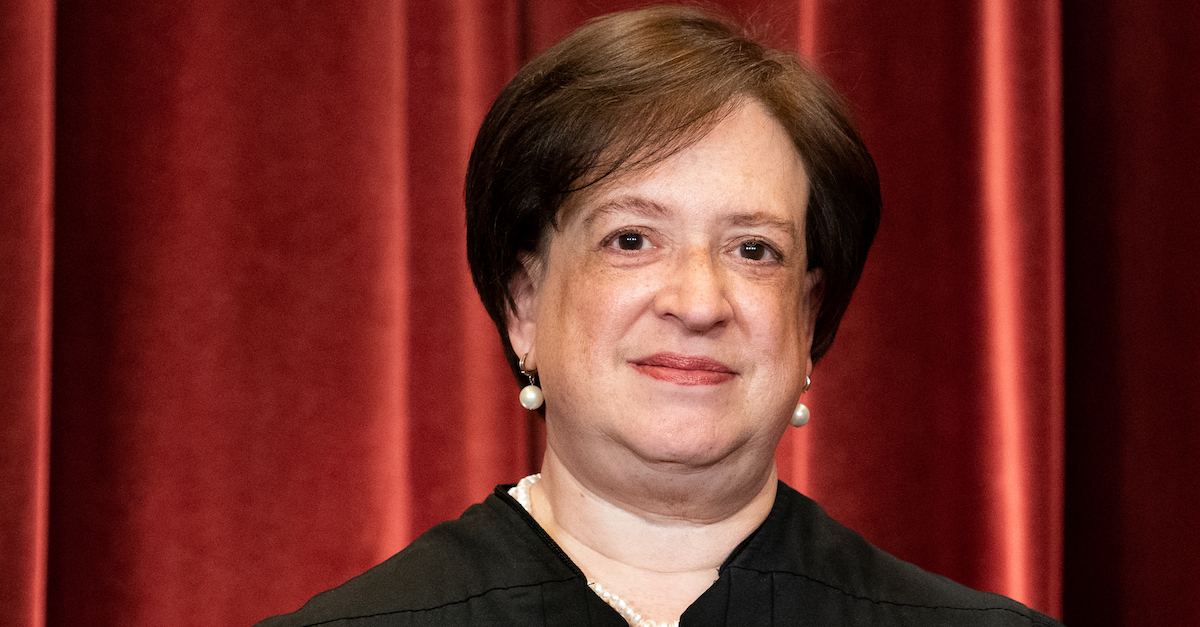
Associate Justice Elena Kagan stands during a group photo of the Justices at the Supreme Court in Washington, DC on April 23, 2021 (Photo by Erin Schaff-Pool/Getty Images).
The Supreme Court struck down President Joe Biden’s student loan forgiveness plan Friday as an overreach of executive-branch authority.
Chief Justice John Roberts wrote for the Court’s six member majority in Biden v. Nebraska, rejecting the argument that the Higher Education Relief Opportunities for Students (HEROES) Act of 2003 gave the secretary of education the power to cancel approximately $430 billion in student debt as part of the response to the COVID-19 pandemic.
“The question is not whether something should be done; it is who has the authority to do it,” wrote Roberts.
The Court’s conservative majority ruled that the six states that sued to challenge Biden’s plan did indeed have standing to sue, despite the fact that it is the Missouri Higher Education Loan Authority (MOHELA) — Missouri’s loan-servicing entity — that would bear the direct revenue cuts imposed by the debt forgiveness. The justices ruled that MOHELA is “an instrumentality of Missouri,” because it was created and is governed by state officials.
Similarly, the justices found that the major questions doctrine — which requires Congress to be clear in any delegation of authority to administrative agencies in questions of major political and economic significance — did not favor loan forgiveness.
Roberts said that the HEROES Act provides “no authorization… let alone ‘clear congressional authorization,”” for the debt-relief program, which substantially lowered monthly payments, covered monthly interest payments, and cancelled up to $20,000 worth of federally-held debt for certain debtors.
Justice Elena Kagan penned a lengthy dissent which was joined by Justices Sonia Sotomayor and Ketanji Brown Jackson.
The trio was utterly unconvinced that the Court should have decided the case at all. Finding problems both with the plaintiffs’ standing to sue and with the Court’s jurisdiction under Article III, Kagan repeatedly called the decision an “overreach” that improperly intruded into policymaking.
“Is there a person in America who thinks Missouri is here because it is worried about MOHELA’s loss of loan-servicing fees? I would like to meet him,” snapped a sarcastic Kagan in the dissent. “Missouri is here because it thinks the Secretary’s loan cancellation plan makes for terrible, inequitable, wasteful policy.” Kagan said that the case is one that the Court “has no business deciding,” and that the majority “blows through a constitutional guardrail intended to keep courts acting like courts.”
As for the merits of the case, Kagan was equally unimpressed. The HEROES Act did not specify a particular crisis, Kagan said. Rather, it allowed the secretary to do what is necessary to protect Americans’ financial security in times of national emergency.
“Of course, Congress did not know COVID was coming; and maybe it wasn’t even thinking about pandemics generally,” she wrote. “But that is immaterial, because Congress delegated broadly, for all national emergencies.”
Kagan accused the conservative justices of substituting their own concerns for those of Congress.
“This Court objects to Congress’s permitting the Secretary (and other agency officials) to answer so-called major questions,” she wrote. “Or at least it objects when the answers given are not to the Court’s satisfaction. So the Court puts its own heavyweight thumb on the scales.”
Kagan said the Court “is supposed to stick to its business — to decide only cases and controversies,” and was meant to stay away from policy judgments. Failure to stay in its lane, said Kagan, risks the Court posing “a danger to a democratic order.”
She also said that the majority decision “moves the goalposts” on the major-questions doctrine in a way that threatens to strip the executive branch of even more powers in the days to come.
“Who knows — by next year, the Secretary of Health and Human Services may be found unable to implement the Medicare program under a broad delegation because of his actions’ (enormous) ‘economic impact,’” came Kagan’s sardonic warning.
In the companion case, Department of Education v. Brown, the justices ruled unanimously Friday that the plaintiffs lacked standing. In that case, two students sued to block the program because their loans were not forgiven under the plan — a position that Sotomayor called “totally illogical” during oral arguments.
Justice Samuel Alito penned a brief decision for the unanimous court in which he said the two plaintiffs failed to establish any injury for not having their loans forgiven that would be traceable to the plan.
Have a tip we should know? [email protected]







